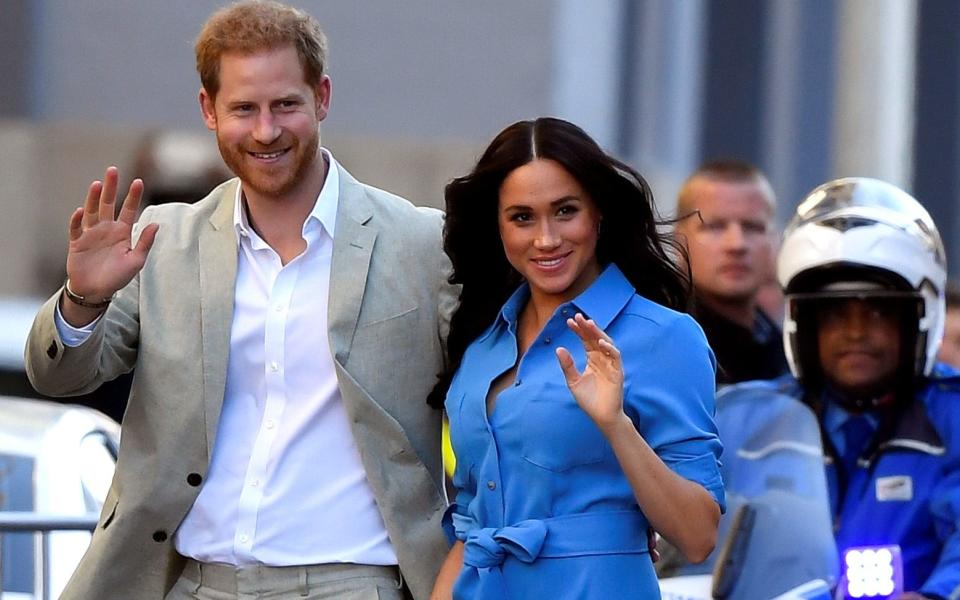Meghan and Harry will need taxpayer funded security 'for years to come'

The Duke and Duchess of Sussex will need to be protected at taxpayers’ expense against the threat of terror attacks and kidnap for years to come, security experts have said.
Police and former security chiefs fear the couple will continue to be at risk from organised terror groups, political fanatics and lone obsessives long after they separate from the Royal family.
Talks are understood to be taking place at senior levels over the best way of providing protection for Meghan and Prince Harry as they divide their time between Britain and their new life in North America.
But there are fears among some experts that palace and government officials may be underestimating both the potential threat and what is required to protect the couple against it.
Dai Davies, who was Head of Royal Protection from 1994 to 1998 and former Chief Superintendent (Divisional Commander) Metropolitan Police Service, said: “We have to learn the lessons of history and act on them. Anyone in charge of security has to think the impossible and then think it again and I fear there is not enough of that going on by the experts currently in charge.
“One thing you can be sure of is that terrorists and others who pose a threat are thinking about it all the time.”
Mr Davies said the three main threats come from jihadist terrorists targeting Prince Harry, who also served in Afghanistan; lone ‘fixateds’ and royal obsessives; and right wing extremists with an hatred of Meghan as a woman of colour marrying into the royal family.
Minister and senior police officers are thought to be determined to avoid the mistakes made over Diana, Princess of Wales, who in 1993 turned down publicly funded police protection except when she was with her sons William and Harry or staying at Kensington Palace.
That left her relying on private security at other times, leading to her being in the hands of the Ritz Hotel’s head of security Herni Paul on the night she died when their car crashed in the Pont de l'Alma underpass as he tried to evade photographers following Diana.
Her bodyguard, Trevor Rees-Jones was badly injured in the crash, on 31 August 1997.
Ken Wharfe, who served as Diana's royal protection officer for six years, resigned from the position in 1993, has since said that if he and his team were working with the Princess in 1997, they may have been able to prevent her death.
Mr Davies, who said there have been far more plots against the Royals than publicly acknowledged, added: “We don't want the situation where Harry and Meghan are being followed, without protection, by paparazzi or people with a fixation and we need to be sure that protection is of the highest level.”
But he added that the high cost of providing security may cause resentment among British taxpayers if the Sussexes begin to earn large sums of private income outside of any Royal duties they continue to carry out.
“The question is whether the British public will wear the cost of security, even if it is miniscule in real terms, over a long period,” said Mr Davies, who was in charge of protection for the Queen and the Royal family throughout the UK and worldwide.
Lord West of Spithead, who was a security minister from 2007 to 2010, said that Harry and Meghan would be expected to make a contribution towards the cost of their security should they start earning a large amount of private income.
But he said there was no question that high levels of police protection would have to be provided by the British government into the future.
“We have got an obligation to provide security for one of the Queen’s sons and his family and that’s a long term obligation,” he said. “It would be nice to work out an arrangement with the Canadians, but we can’t not provide that protection ourselves, regardless.
Mike Penning MP, who was police minister from 2014 to 2016 and went on to serve as justice and Armed Forces minister, said: “It doesn’t matter who they are, if they are at risk we have a duty to protect them, it’s as simple as that. That requirement should be based on any risk assessment made by our intelligence services and by the Canadians.”
